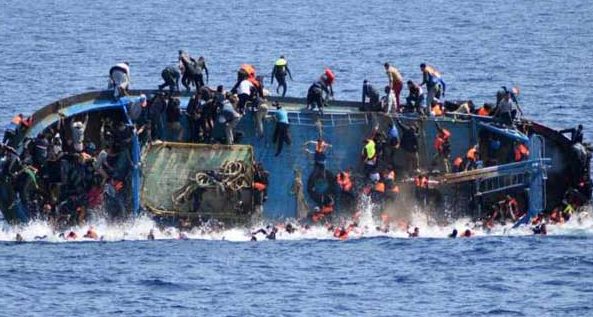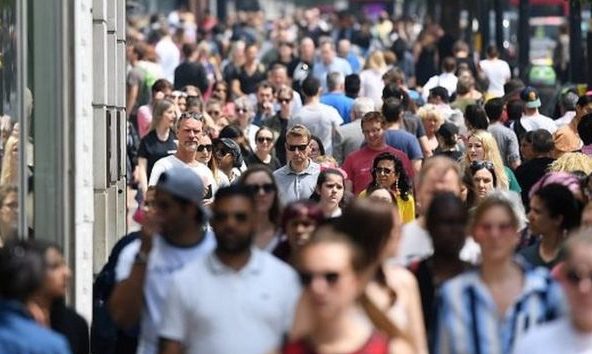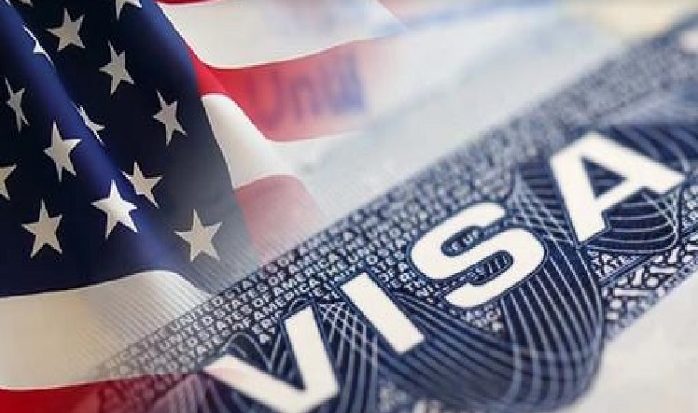About 100 migrants and refugees are missing and feared dead after their boat capsized off the coast of Libya, according to the Libyan coastguard.
Libya, with its weak central government and proximity to Italian territory, is increasingly becoming the preferred option for many refugees despite the dangers involved in crossing the Mediterranean Sea.
The Libyan coastguard picked up 16 survivors from the boat just east of the capital, Tripoli, an official said on Friday.
An explosion during the voyage which caused the engine to catch fire is believed to have been the determining factor behind the incident, survivors were quoted as saying by AFP news agency.
“When I saw the number of people on the boat, I refused to get on board because we had been told that we would be 20 (passengers),” said survivor Amri Swileh, from Yemen.
Showing his bruised arms, the 26-year-old said smugglers threatened to shoot him and forced him onto the boat which was just eight metres long.
“I saw people burn,” he said.
“I lost all of my Yemeni friends who were with me. All five of them are missing.”
Another survivor, Bakari Badi, said early in the journey a man fell into the water and had to climb back onto the overcrowded craft.
“People were saying to the captain to go back to Libya but by then our engine exploded. So many people were wounded,” the 32-year-old Gambian said.
The exact number of migrants aboard the boat at the time of the incident is not known yet but while 15 women were on board the ship, all of the 16 rescued were young men.
Those missing include two babies and three children under the age of 12.
The passengers included several Moroccan families, none of whom survived, as well as Syrians and Sudanese.
US ambassador to Estonia resigns ‘over Trump comments’
The US ambassador to Estonia is resigning, reportedly in frustration at remarks made by President Donald Trump about America’s European allies.
James D Melville revealed in a Facebook post that Mr. Trump’s comments had brought forward his decision to retire, Foreign Policy magazine reported.
The US president has imposed trade tariffs on some EU industries and strongly criticised Nato allies.
Other US diplomats have also left their posts early in recent months.
In January, US ambassador to Panama John Feeley resigned saying he was no longer able to serve under President Trump.
A month earlier, Elizabeth Shackelford resigned from her post in Nairobi where she worked for the US mission to Somalia.
In her letter of resignation to then Secretary of State Rex Tillerson, she said she was quitting because the US had abandoned human rights as a priority, Foreign Policy reported.
In the private Facebook post seen by Foreign Policy, Mr. Melville reportedly told friends: “For the president to say the EU was ‘set up to take advantage of the United States, to attack our piggy bank’, or that ‘Nato is as bad as Nafta [the North American Free Trade Agreement]’ is not only factually wrong, but proves to me that it’s time to go.”
Mr. Melville is a career diplomat and took up his position as ambassador in Estonia in 2015 after being nominated by then President Barack Obama.
He had previously held senior diplomatic posts in several European countries and speaks Russian, German and French, according to his biography on the US State Department website.
A State Department spokesperson confirmed Mr. Melville’s departure on Friday, saying: “Earlier today, the United States’ Ambassador to Estonia, Jim Melville, announced his intent to retire from the Foreign Service effective July 29 after 33 years of public service.”
President Trump reiterated his criticism of fellow Nato members on Friday while on a flight from Washington to his private golf club in New Jersey.
He told reporters on board Air Force One that countries including Germany, Spain and France had to increase their financial contributions to the bloc.
“It’s not fair what they’ve done to the United States,” he said. “The United States is paying much more disproportionately to anyone else.”
His remarks come less than two weeks before a Nato summit in Brussels.
Surge in Britons getting EU nationality
There has been a surge in UK citizens acquiring the nationality of another EU country since the Brexit referendum, according to data obtained by the BBC.
READ ALSO: LECTURE: BROKEN TRUTHS: NIGERIA’S ELUSIVE QUEST FOR NATIONAL COHESION BY REV. DR. MATHEW KUKAH
In 2017 a total of 12,994 UK citizens obtained the nationality of one of the 17 member states from which the BBC has received figures.
This compares with 5,025 in 2016 and only 1,800 in 2015.
The most frequent new nationality was German, which saw a huge jump from just 594 cases in 2015 up to 7,493 in 2017.
The rise is presumed to be the result of Britons who can meet the criteria seeking to keep their legal rights attached to European Union membership.
The 2017 figure is about seven times the 2015 level.
The dramatic increase is consistent across many countries.
France was the second most popular nationality, jumping from 320 instances in 2015 to 1,518 last year, and then Belgium, where the increase was from 127 to 1,381.
The number for Ireland rose from 54 in 2015 to 529 in 2017.
However, this does not include new Irish passport applications from the much larger number of people who already had entitlement to Irish citizenship, due for example to being born in Northern Ireland.
The dramatic increase is consistent across many countries.
France was the second most popular nationality, jumping from 320 instances in 2015 to 1,518 last year, and then Belgium, where the increase was from 127 to 1,381.
The number for Ireland rose from 54 in 2015 to 529 in 2017.
However, this does not include new Irish passport applications from the much larger number of people who already had entitlement to Irish citizenship, due for example, to being born in Northern Ireland.
UN warns of ‘catastrophe’ as 160,000 flee southern Syria push
The United Nations has warned of a looming “catastrophe” in southern Syria, as it raised the number of people fleeing a fierce government offensive aimed at retaking rebel-held areas to 160,000.
Zeid Ra’ad al-Hussein, the UN’s high Commissioner for human rights, said in a statement on Friday that there was a “grave risk that intensified fighting will see many civilians trapped,” condemning “[how] civilians in Syria continue to be used as pawns by the various parties.”
Launched on June 19, the Syrian government’s military push is intended to recapture the southern provinces of Deraa, Quneitra and parts of Sweida, still mostly held by opposition fighters.
With backing by Russian air support, forces loyal to President Bashar al-Assad have retaken territory and continue to progress southwards where the last pockets of opposition remain.
Al-Hussein said his office received reports that “in the last few days, civilians at some government checkpoints in the southern-eastern and western parts of Deraa have only been allowed through to government-held areas in Deraa city and Sweida governorate for a fee.
“To add to the bleak situation facing civilians, there are also reports that ISIL fighters in control of the Yarmouk Basic area in the western part of Deraa governorate are not allowing civilians to leave the areas under their control.”
Zeid emphasised the warring factions’ responsibility towards civilians under international law which mandates that they “do their utmost to protect civilians … [and] provide safe passage to those wishing to flee.”
Separately, the UN office for the Coordination of Humanitarian Affairs (OCHA) said on Friday that the surge in fighting over the past two days had led to the displacement of an estimated 160,000 people – more than three times as previously reported.
“Many of those that have been displaced in the recent surge in hostilities are reported to have moved towards the Jordanian border and towards Quneitra, close to the Golan Heights area,” it said in a statement.
Earlier on Friday, a temporary truce in Deraa between government forces and the rebel group, Free Syrian Army (FSA), brokered by Russia and Jordan, ended at noon local time (09:00 GMT).












